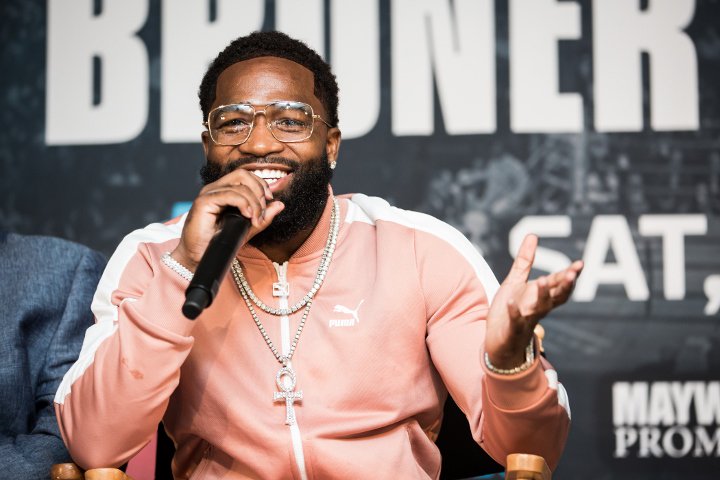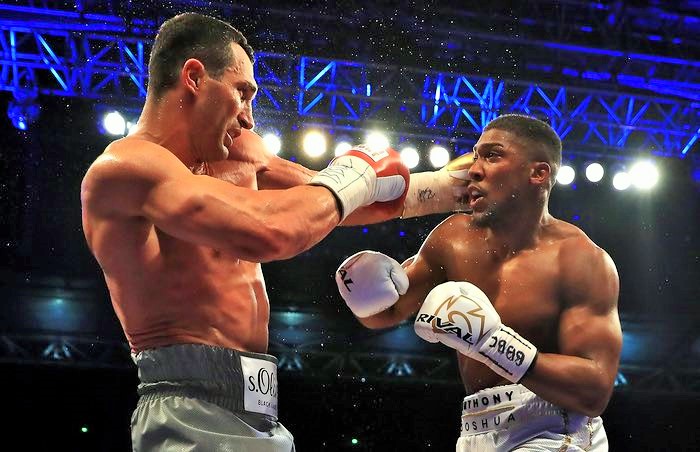In Search Of Lost Time: Adrien Broner Gets Serious
“I’m trying to be the best boxer there ever was. Ever. Ever.” – Adrien Broner, being interviewed by Roy Jones in 2012
“It’s time to take boxing more seriously.” – Broner, at a July 21 conference call
Adrien Broner is finally serious. This is the message that’s emanated from his camp in advance of Saturday’s fight with Mikey Garcia in Brooklyn. That it was lost amid the Mayweather-MacGregor orgy is ironic, given Floyd’s role as the antecedent to Adrien’s self-creation. But it’s something we’re hearing again, now only days removed from the finest opponent of his career. Once marked for boxing immortality and now a cautionary tale, Adrien “The Problem” Broner has straightened his priorities.
So far, he has passed surface tests. “The Problem” is in sharp physical condition and ready to make the junior welterweight limit lest he forfeit $500 000 on the scale. He appears more focused (by his standards), having stressed in interviews the seriousness of his preparation. He is at least saying the right things.
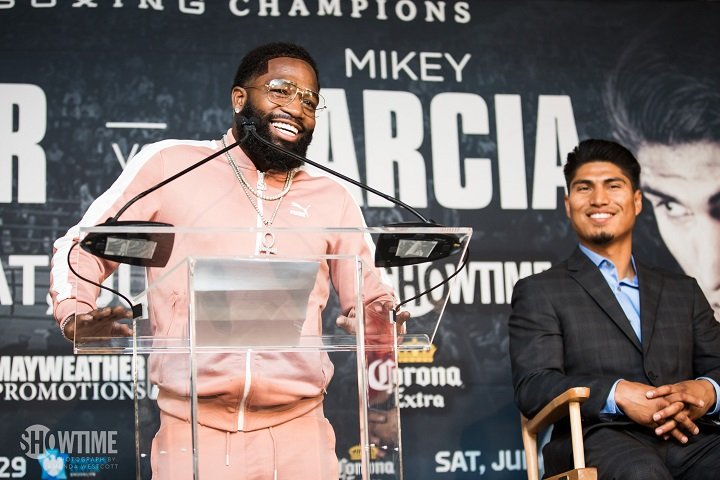
Broner’s grilled and gilded mouth has forever been a trove of inanities, and today’s wizened speech counts for nothing because politesse is parenthetical to being a good boxer. Whether Broner can fight is really all that matters, and whenever he’s found himself among the best in his class, the Cincinnatian has struggled. Outside of the ring, his arrests, self-aggrandizements, seedy videos and violent street encounters were indictments of his lack of focus, each a symptom of the pathological arrogance that has doomed Broner in boxing and beyond.
It is unfortunate that the human brain and body do not progress in equal step. When our bodies enter their physical primes, our minds — unable, yet, to call upon wisdom won by life experience — invariably lag behind. And Broner, already famous (by boxing standards) in his early twenties, evinced the same quality that befalls many of us young men: it is an unearned self-assurance, in which the opinions of others don’t matter because we’ve figured out the world and have nothing left to learn. The problem with being so smart, so young, is that we’re too stupid to realize we don’t know anything at all.
Had Broner spent more time developing as a fighter he may have a chance on Saturday. Had he, say, learned to box under pressure and execute a fight plan, divested himself of a shoulder roll he was never savvy enough to use, or learned to fight with urgency in each round, he may have become the star boxing media declared he would. But Broner never did, having proclaimed — before he had evidence to substantiate it — that he was destined to become a king, and rather than channel his energy into improving AB spent years doing the debauch. Now 27, he’s entered the second phase of a playboy athlete’s arc: when the missteps have become exhausting and career urgency finally sets in.
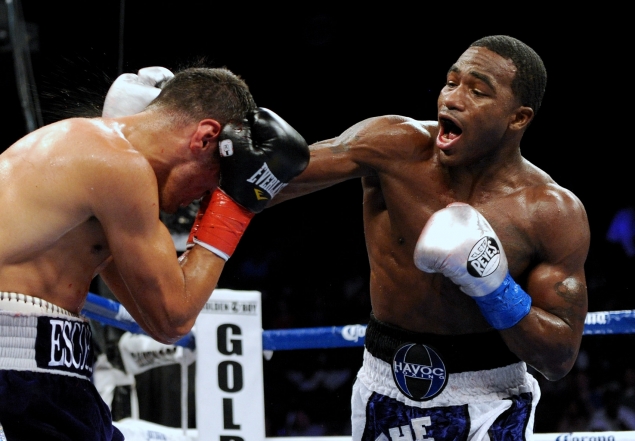
One of the chief architects of Broner’s myth was HBO, the network that gave him a platform upon which to do things like come in 3.5 lbs over the contracted weight limit versus Vicente Escobedo on July 21, 2012, whom “The Problem” knocked out in five rounds. This is instructive of how Broner’s supposed greatness came to be: by stopping smaller men on premium cable, whereupon the announcers could offset acknowledgements that he hadn’t played by the rules by extolling his “next level” abilities.
But were his skills really ever that rare? Broner has fluid hands and is a sharp puncher. He has a fine degree of talent — one that can produce a nice aesthetic display if the circumstances are right — but not an otherworldly amount. He was simply fortunate (or cursed, given the negative impact stardom seemed to exercise) of having a template upon which he could mould himself: “big bro” Floyd Mayweather showed Broner the virtue of obnoxiousness, and the younger fighter was just smart enough to follow the older man’s example, just talented enough to pass himself off as a facsimile, and HBO was just desperate (or dumb) enough to propagate the hype.
But Broner never possessed any of Floyd’s work ethic, became too consumed by a reputation he had not properly earned, and…blah, blah, blah, you already know the rest. Now he fights Mikey Garcia – himself someone who lost significant time during his prime, albeit for a very different reason – at the Barclays Center, and it’s fitting “The Problem” finds himself again in Brooklyn. Four years ago he narrowly outpointed Paulie Malignaggi there to win the WBA jr. welterweight title. During his post-fight interview with Showtime jackass Jim Gray, he memorably boasted about having taken Paulie’s girl (“Don’t brag about taking my sidepiece. You don’t get laid” a sore Malignaggi screamed back).
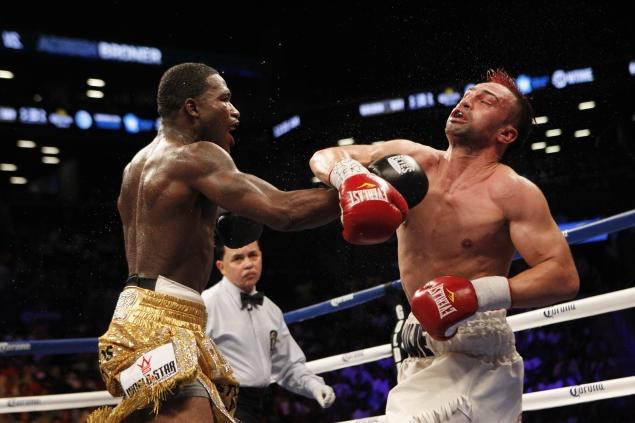
This was the high mark of Broner’s career, but don’t blame yourself if its memory is faint. The night’s most striking moment came not in during main event but on the undercard, when perhaps because of unofficial contract obligations Jonathan Banks refused to finish Haymon heavyweight Seth Mitchell. Broner’s win was less odious than Mitchell’s, but entirely predictable as the sort of engineered success you expect from someone propped up by the establishment. In its promotion, outcome, and general unpleasantness, this victory is both Broner’s best and an encapsulation of his career.
Returning to the introduction, is “cautionary tale” too harsh an assessment? If, as Broner suggests, he’s completely focused on boxing, should his best self not be taken seriously? Fans should hope his focus is genuine, because an urgent AB will at least make for an interesting fight, one in which his strength and hand speed flummox Garcia, who will be fighting at 140 lbs. for the first time. A more realistic assessment of his chances, however, finds Broner past saving himself: he never listened when he should have, wasted crucial developmental time and is now far too incomplete a fighter to vie with the sport’s best.
One of the cruelest things about boxing is that time doesn’t wait for a fighter to take it seriously.
— Eliott McCormick

